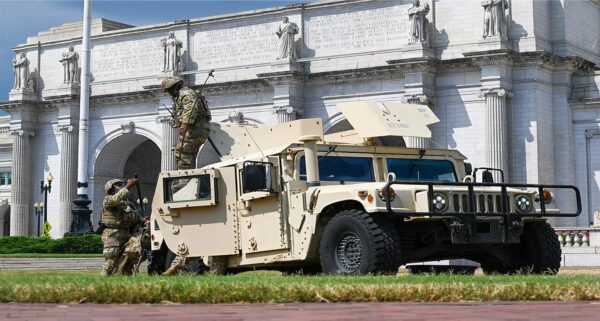Privacy and Power: National Guard Protections Under the Privacy Act Remain Vital in Today’s Environment

Photo By Tech. Sgt. Andrew Enriquez –
This image was released by the United States National Guard with the ID 250815-Z-EZ983-1008
In 2009, the D.C. Circuit Court of Appeals confronted a seemingly technical, but critically important question: Does the Privacy Act protect members of federally recognized National Guard units when they are not on active federal duty?
The case, In re Sealed Case, No. 07-5251 (D.C. Cir. 2009), involved a Vermont Army National Guard member whose sensitive personal information was improperly disclosed. Represented by David P. Sheldon, the appellant challenged the government’s attempt to carve out the National Guard from the Privacy Act’s protections whenever guardsmen were not on federal activation orders.
The government argued that state Guard units, when not federalized, were “state entities” beyond the Privacy Act. The district court agreed and dismissed the case. On appeal, however, the D.C. Circuit reversed, holding that the statutory structure of Title 10 and the Privacy Act compelled the opposite conclusion: a National Guard unit is always part of the Army National Guard of the United States (ARNGUS), which in turn is a reserve component of the Department of the Army, a “military department” expressly covered by the Privacy Act.
Judge Kavanaugh’s Concurrence
The panel opinion was authored by Judge David Tatel, with a separate concurring opinion by Judge Brett Kavanaugh. Judge Kavanaugh agreed with the outcome but emphasized a streamlined statutory approach. He underscored that the Department of the Army is plainly an “agency” under the Privacy Act and that federally recognized Guard units, by definition, fall under the Army’s umbrella. His concurrence dismissed attempts to overcomplicate the statutory analysis, warning that Congress had already spoken clearly: Guard units federally recognized under Title 10 remain tied to the Army’s command structure and thus remain subject to federal obligations under the Privacy Act.
David P. Sheldon’s Argument
In oral and written arguments, David P. Sheldon advanced the principle that privacy protections must travel with the soldier, regardless of whether a Guard unit is under state or federal command. “The dignity of service members requires no less than full protection of their private information, whether they are standing guard at home or serving abroad,” Sheldon argued in the case.
That position carried the day, shaping precedent for thousands of Guard members across the nation.
Why It Matters Today
The reasoning in In re Sealed Case resonates even more strongly in the present environment:
- Expanded Federal Utilization of the Guard. Guard units are increasingly activated for missions that blur federal and state roles—border enforcement, pandemic response, natural disaster relief, and civil unrest. Their entwinement with federal operations makes the distinction between “state” and “federal” duty even less meaningful. Kavanaugh’s statutory reading—that federally recognized units are always part of ARNGUS—fits today’s operational realities.
- Growing Data Vulnerabilities. With AI systems, electronic health records, and broad interagency data sharing, the risk of wrongful disclosure or algorithmic error in Guard members’ personal information has grown exponentially. The Privacy Act, designed to check exactly these risks, must remain robust.
- Current Administration’s Military Policies. Recent administrations, including the current one, have leaned heavily on Guard forces for politically sensitive missions. Attempts to sidestep federal accountability by pointing to “state status” would threaten Guard members’ rights at precisely the moment they need federal protection most.
Conclusion
The D.C. Circuit’s 2009 decision, argued by David P. Sheldon and joined in judgment by Judge Brett Kavanaugh remains good law. Its logic has only gained strength. The Privacy Act applies to the National Guard not as a matter of policy preference, but because Congress has mandated it. In an age of unprecedented reliance on the Guard and unprecedented risks to personal data, this precedent serves as a vital safeguard for those who serve.
References & Resources
- In re Sealed Case, No. 07-5251, 551 F.3d 1047 (D.C. Cir. 2009). govinfo.gov
- Perpich v. Department of Defense, 496 U.S. 334 (1990). Justia USSC
- Privacy Act of 1974, 5 U.S.C. § 552a. Justice.gov
- Title 10, U.S. Code §§ 101(a)(6), 10101, 10105, 10106, 10107. govinfo.gov
- Army Regulation 340-21, The Army Privacy Program. Download
- Defense Privacy Board, Applicability of the Privacy Act to National Guard Records (1992). PCLT
Disclaimer
This publication is for informational purposes only and does not constitute legal advice. Reading this article does not create an attorney-client relationship. Service members and federal employees facing Privacy Act or related issues should consult with qualified legal counsel regarding their specific circumstances.
About the Law Offices of David P. Sheldon, PLLC
Based in Washington, D.C., the Law Offices of David P. Sheldon, PLLC is a nationally recognized firm dedicated to defending the rights of service members, federal employees, and veterans. From courts-martial to federal employment disputes, medical retirement cases, and Privacy Act litigation, our attorneys combine deep knowledge of military and federal law with an unwavering commitment to justice.
